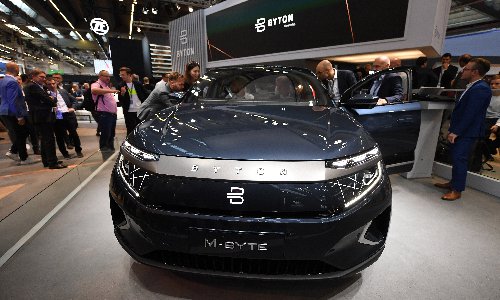
File Photo: A Byton M-Byte is on display during the first press day of Germany's International Motor Show (IAA) 2019 in Frankfurt, Germany, on Sept. 10, 2019. (Xinhua/Lu Yang)
This year's International Motor Show (IAA) in Frankfurt was held at a time marked by both industrial transformation and uncertainties in global trade, with a fewer number of exhibiting brands and smaller area for exhibition.
However, with converging interests in electrification and new technologies, the Chinese and German auto sectors managed to deepen their cooperation amid global headwinds.
Some 800 exhibitors registered for the IAA this year, and China, with lots of companies attending the show, holds the first place among the international exhibitors.
Chinese car makers like Great Wall Motors and startup Byton all held events revealing their new cars on the first media day, mostly in the premium segment. The booths of Chinese brands were frequented by their German peers during the exhibition.
On the other hand, executives from Chinese car companies would not miss the chance to visit the booths of German manufacturers such as BMW, Daimler and Volkswagen, which showcased their latest product portfolios at the IAA.
Industry observers say the concept cars and mass-produced models of both Chinese and German brands this year demonstrated the trends of electrification and intelligent vehicles, areas where their future cooperation could focus on.
Some newly announced projects confirmed the deepened cooperation, including a long-term strategic cooperation agreement announced in early September between Robert Bosch GmbH and Contemporary Amperex Technology Co. Limited (CATL) to develop high-performance battery cells.
German car makers including Daimler, BMW and Audi also partnered with leading Chinese technology companies such as Tencent, Alibaba, and Huawei to develop future mobility solutions involving intelligent, connected vehicles and autonomous driving.
Chinese market is extremely important not only by volume, but also for its role among the leading markets in the world involving future technologies, including autonomous driving, digitalization, according to Nicolas Peter, member of the board of management of BMW AG for finance.
Peter said the company has been scouting out possibilities to invest in startups in China "because we clearly can experience the creativity of the industry". This is a clear example of how cooperation in the auto sector has been carried forward on various fronts.
Stefan Hartung, member of the board of management of Bosch, said the company has been actively engaging with its Chinese partners and continues to invest in R&D centers, factories, and capabilities in China. "In the long-term, I am very optimistic," he said.
A lot of German companies agreed on the importance of the Chinese market, and pursued a "in China, for China" strategy with tailored models and localized production. Furthermore, some of them is shifting towards "in China, for the world."
Peter said BMW is optimistic about the Chinese market and plans to kick off the production of fully electric iX3 models in its plant in northeast China's Shenyang about next fall and export the cars to the markets worldwide. "This underlines again the relevance of the Chinese market for the BMW Group," he added.
Amid a worldwide industry slowdown, no single player in the car industry could be spared, Ferdinand Dudenhoeffer, automotive expert at the Center for Automotive Research under the University of Duisburg-Essen, told Xinhua, adding that Germany should open up its market more for Chinese companies.
Chinese companies have taken steady steps in tapping into the German market. For example, CATL plans to build a battery plant in Erfurt and car-maker startups Byton and Nio already built design centers in Munich.
Ding Qingfen, Byton's chief of staff, said German employees took part in every stage of product making, from technology, design to marketing and PR, and German and Chinese staff learn from each other.
Zhang Hui, managing director of Nio Germany, said all car-makers, be it old or new, Chinese or German, face the same challenge of directing consumers away from traditional combustion engine and towards new power systems.
Only if the entire market for new energy vehicles is made bigger can each player get a bigger slice, Zhang said.
